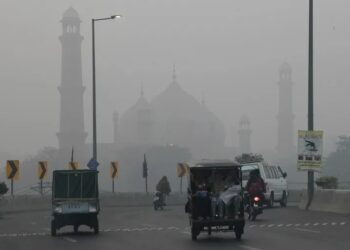Written by: Abdul Basit Alvi
Since its inception in 1947, the issue of Jammu and Kashmir has been central to Pakistan’s national identity and foreign policy. Pakistan’s steadfast support for the Kashmiri cause is deeply rooted in historical context, religious and cultural connections, legal arguments, and a moral imperative to stand with a people who have suffered decades of conflict, displacement, and disenfranchisement. This unwavering stance goes beyond rhetoric, reflected consistently in Pakistan’s policies, institutions, and national consciousness. Over the years, Pakistan has advocated for the Kashmiris’ right to self-determination through diplomatic, political, moral, and humanitarian channels.
Pakistan’s commitment to Kashmir dates back to the tumultuous events surrounding the 1947 partition of British India into India and Pakistan, a process guided by the principle of religious majorities. Princely states were allowed to choose accession to either dominion, ideally considering geographic proximity and the will of the populace. Jammu and Kashmir, a Muslim-majority region ruled by a Hindu Maharaja, was widely expected to join Pakistan due to its demographic and cultural alignment. However, in October 1947, the Maharaja acceded to India under contentious circumstances, leading to the first war between India and Pakistan. The conflict drew in the United Nations, which passed resolutions advocating for a plebiscite to let the people of Jammu and Kashmir determine their future. These resolutions have since formed the legal bedrock of Pakistan’s position on the matter. Pakistan continues to insist that Kashmiris be granted the right to decide their fate through a UN-supervised plebiscite.
Kashmir holds not only strategic value for Pakistan but also immense ideological importance. Pakistan’s founder, Quaid-e-Azam Muhammad Ali Jinnah, famously referred to Kashmir as Pakistan’s “jugular vein,” underscoring its critical role in the country’s national identity and geography. Deep-rooted religious, cultural, and ethnic ties between Pakistan and the people of Kashmir have further solidified this connection. The ideological dimension of Pakistan’s stance is linked to its founding vision as a homeland for Muslims in South Asia. With over 70% of Jammu and Kashmir’s population being Muslim, Pakistan views its support for the Kashmiri right to self-determination as both a moral and ideological obligation.
Pakistan’s position is also backed by several United Nations Security Council (UNSC) resolutions, notably Resolution 47 of 1948, which recognize Kashmir as a disputed territory and call for an impartial plebiscite under UN oversight. Pakistan continues to urge the global community to uphold these resolutions and facilitate a peaceful, lawful resolution to the conflict.
On the international stage, Pakistan has consistently raised the Kashmir issue at every available forum, including the United Nations General Assembly (UNGA), the Organization of Islamic Cooperation (OIC), the European Union, and various human rights organizations. Pakistani leaders—presidents, prime ministers, and foreign ministers alike—have routinely highlighted the plight of the Kashmiri people and called for justice. In the wake of India’s abrogation of Article 370 in August 2019, which removed Jammu and Kashmir’s special constitutional status, Pakistan launched an intensive diplomatic campaign, labeling the move as “unilateral and illegal.” In response, Pakistan downgraded diplomatic relations with India, suspended bilateral trade, and appealed to the international community to intervene, urging pressure on India to reverse its actions and honor the rights of Kashmiris. The Pakistan Armed Forces have also repeatedly affirmed their commitment to defending the people of Kashmir and their cause. Although Pakistan advocates for a peaceful resolution to the Kashmir dispute, its military asserts that any threat to the Kashmiri people or infringement of their rights will be met with firm resistance. The Inter-Services Public Relations (ISPR), the media arm of Pakistan’s military, consistently releases statements reaffirming the army’s unwavering support for the Kashmiri cause. Senior military leaders, including the Chief of Army Staff, often emphasize that Pakistan remains fully prepared to defend the rights of Kashmiris and is ready to take all necessary measures, including military action, to deter any form of aggression. Kashmir Solidarity Day, observed annually on February 5th, is commemorated not only through public gatherings and civil events but also with formal military ceremonies, symbolizing Pakistan’s unified stance with the people of Kashmir. Perhaps the clearest expression of this commitment lies within the collective consciousness of the Pakistani population. From one end of the country to the other, citizens demonstrate a profound emotional connection with Kashmiris. Media outlets extensively cover developments in the region—highlighting human rights abuses and political shifts—with consistent empathy and concern.
Nationwide, rallies, seminars, educational initiatives, and awareness campaigns are organized year-round to promote the Kashmiri cause. Pakistani artists, poets, and musicians frequently dedicate their work to the ongoing struggle in Kashmir, keeping the narrative of resistance and solidarity alive. From schoolchildren to scholars, support for Kashmir transcends age, class, and region, forming a cross-generational bond that resonates deeply across society.
Beyond diplomatic efforts and public statements, Pakistan has extended tangible humanitarian aid, especially in Azad Jammu and Kashmir (AJK). The government has made significant investments in education, infrastructure, and healthcare in the region, presenting AJK as a testament to its commitment to Kashmiri welfare. Additionally, Pakistan provides scholarships to thousands of students from IIOJK, enabling them to pursue higher education across its universities. NGOs and civil society groups frequently conduct relief operations for families affected by conflict or natural disasters in Kashmir.
Moreover, Pakistan has given space to exiled Kashmiri leaders, journalists, and activists in its media and diplomatic platforms, allowing their voices to reach a global audience—especially during times when communication channels are restricted in IIOJK. Through these efforts, Pakistan has played a role in amplifying the aspirations and grievances of the Kashmiri people on the world stage.
Despite decades of tension and entrenched positions between India and Pakistan over Kashmir, Islamabad has consistently advocated for peaceful dialogue and resolution. Successive Pakistani governments have expressed a willingness to engage in bilateral talks—on the condition that Kashmir remains central to the discussions and that Kashmiri voices are included. Pakistan maintains that lasting peace in South Asia is impossible without a just and fair resolution of the Kashmir issue. It firmly believes that the road to regional peace must pass through Srinagar and that until the Kashmiri people are granted their right to self-determination, stability will remain out of reach.
Leaders of Pakistan, past and present, have continuously shown deep affection and commitment toward Kashmir. The country’s founding father, Quaid-e-Azam Muhammad Ali Jinnah, laid the ideological foundation of Pakistan’s bond with Kashmir. His iconic statement—”Kashmir is the jugular vein of Pakistan”—continues to echo through generations, symbolizing the significance of Kashmir in Pakistan’s national identity. Jinnah believed that Kashmir, due to its Muslim-majority population and geographical proximity, was a natural part of Pakistan. From the very beginning, he extended diplomatic and political support to the Kashmiri people, setting the tone for Pakistan’s enduring stance. Pakistan’s first Prime Minister, Liaquat Ali Khan, also demonstrated unwavering dedication to the Kashmir issue, playing a pivotal role in bringing the matter to the international spotlight, particularly through the United Nations. During his time in office, Liaquat Ali Khan actively engaged diplomatic avenues to push for the enforcement of United Nations resolutions advocating a plebiscite in Kashmir. He consistently underscored that Pakistan’s support for the Kashmiri cause extended beyond political or territorial interests, grounding it firmly in moral and humanitarian principles—a stance that would shape Pakistan’s Kashmir policy for generations. Among Pakistan’s leaders, few have matched the emotional fervor and unwavering advocacy for Kashmir demonstrated by Zulfikar Ali Bhutto. As both Foreign Minister and Prime Minister, Zulfikar Ali Bhutto championed the Kashmir cause at every major international platform. At the United Nations Security Council, he famously tore up proposals he deemed unjust to the Kashmiri people and walked out in protest—an act that earned admiration both domestically and internationally. His speeches were powerful declarations of solidarity, filled with emotion and resolve. One of his most quoted statements—“We will wage a thousand-year war for Kashmir if needed”—while symbolic, captured the profound depth of Pakistan’s emotional, ideological, and strategic connection to the region. In addition to his passionate advocacy, Bhutto also worked to strengthen Pakistan’s defense capabilities, aligning the country’s military preparedness with its stance on Kashmir.
His daughter, Benazir Bhutto—the first female Prime Minister in the Muslim world—carried forward his legacy with equal fervor and compassion. Her addresses often highlighted the human rights abuses faced by civilians in IIOJK. She mobilized public opinion through mass rallies and became a beacon of hope, particularly for Kashmiri women and youth. Under her leadership, Kashmir Solidarity Day gained prominence as a national observance, further embedding the cause in Pakistan’s collective consciousness. She consistently affirmed that Pakistan’s moral and diplomatic support for Kashmir would never waver.
Nawaz Sharif, who served as Prime Minister three times, also upheld Pakistan’s enduring support for Kashmir, with a strong emphasis on diplomacy and international engagement. During the 1990s and again in the 2010s, he raised the Kashmir issue at major global forums, including the United Nations General Assembly. His speeches often took on a personal tone, reflecting the pain and suffering of the Kashmiri people, and called upon the international community to act. In one such address, he declared: “Kashmir is not an internal matter of India; it is a matter of humanity and international concern.” He advocated for confidence-building measures while ensuring Kashmir remained at the core of any dialogue with India.
As both a military leader and later as President, General Pervez Musharraf approached the Kashmir issue with a mix of strength and pragmatism. While maintaining a firm stance on Pakistan’s position, he introduced several confidence-building initiatives with India—most notably the Muzaffarabad-Srinagar bus service, which helped reunite families separated by the Line of Control. He also proposed a four-point peace plan that, although never formalized, was widely seen as a sincere effort to move toward resolution while keeping the aspirations of the Kashmiri people at the forefront. His leadership demonstrated that even within a firm national framework, space existed for dialogue and innovation.
Today, Pakistan’s current political and military leadership—including Prime Minister Shehbaz Sharif, President Asif Ali Zardari, and Army Chief General Syed Asim Munir—continue to uphold the country’s unwavering commitment to Kashmir. On every national and international platform, they reaffirm Pakistan’s support, condemn human rights violations, and highlight the issue through diplomatic channels. Kashmir Solidarity Day remains a key observance, while efforts to amplify Kashmiri voices through media, international forums, and humanitarian outreach persist.
Since taking over as Chief of Army Staff in November 2022, General Asim Munir has consistently reiterated Pakistan’s firm resolve to support the Kashmiri people and uphold their right to self-determination. Through both his words and actions, General Asim Munir has consistently emphasized the nation’s unwavering support for the Kashmiri people in their pursuit of self-determination. Speaking at the Azadi Parade on August 14, 2023, held at the Pakistan Military Academy, he reaffirmed this commitment, declaring, “No evil design can withstand the determination of the Kashmiri people.” He strongly criticized India’s decision to revoke Article 370 in August 2019, calling it an “ill-conceived act” intended to unilaterally alter the region’s status. General Asim Munir has consistently reaffirmed Pakistan’s unwavering support for the Kashmiri people’s right to self-determination. He has repeatedly called on the international community to play an active and decisive role in facilitating a UN-mandated plebiscite, enabling Kashmiris to determine their own future. During a meeting with UN Secretary-General António Guterres in December 2023, General Munir stressed that “peace in South Asia will remain elusive until a peaceful resolution to the longstanding Kashmir dispute is achieved in line with UN Security Council resolutions and the aspirations of the Kashmiri people.” He condemned India’s unilateral actions to alter the status of Jammu and Kashmir, asserting that such moves violate international law and UN resolutions.
During a visit to the Line of Control (LoC) in December 2022, General Munir reiterated that Pakistan’s armed forces are “ever ready—not only to defend every inch of our motherland, but to take the fight back to the enemy if war is ever imposed on us.” He emphasized that India’s ambitions in Kashmir would not succeed. In February 2025, he made a bold declaration: “Pakistan has already fought three wars for Kashmir, and if ten more wars are required, Pakistan will fight them.” He underlined that Pakistan would not be deterred by India’s military might or technological advancements, reaffirming the country’s readiness to defend Kashmir and its people under any circumstances.
During a visit to Muzaffarabad, General Munir paid tribute to the martyrs of Kashmir by laying a wreath at the Martyrs’ Monument. He praised the sacrifices of the Kashmiri people and reiterated Pakistan’s firm and enduring commitment to their cause. He has persistently urged the global community to ensure the implementation of UN resolutions and to hold India accountable for its unfulfilled promises to grant Kashmiris the right to self-determination through a fair and impartial plebiscite.
Speaking at the Defence Day ceremony at General Headquarters (GHQ) in Rawalpindi, General Munir strongly condemned India’s occupation of Kashmir and the oppression faced by its people. He accused New Delhi of attempting to change the region’s demographic makeup and warned of the genocide of Muslims in IIOJK. He emphasized that a just resolution of the Kashmir conflict is essential for sustainable peace in South Asia and reiterated Pakistan’s commitment to extending political, moral, and diplomatic support to the Kashmiri people until their aspirations are fulfilled.
In March 2023, General Munir once again took a firm stance, reiterating Pakistan’s call for a peaceful settlement of the Kashmir dispute in line with UN resolutions. He warned India against any misadventure, stating that Pakistan’s armed forces stand ready to defend every inch of the homeland and respond decisively if conflict is imposed.
Beyond the Kashmir issue, General Munir has also highlighted Pakistan’s broader commitment to global peace and security. He emphasized the country’s dedication to enhancing its role in UN peacekeeping missions, pledging to diversify and strengthen contributions. This includes deploying infantry units and expanding capabilities in areas such as aviation, communications, mine action, medical support, peacekeeping intelligence, and innovative capacity building.
Together, General Asim Munir’s actions and statements reflect Pakistan’s steadfast resolve to stand by the Kashmiri people, while also affirming the country’s commitment to peace, justice, and international cooperation. Under his leadership, Pakistan’s commitment to the Kashmiri people in their struggle for justice and self-determination has been further solidified. His steadfast position continues to inspire national and international efforts aimed at achieving a peaceful and just resolution to the Kashmir conflict.
The cultural and religious bonds between Pakistan and Kashmir are deep-rooted and enduring. Both regions share a rich Islamic heritage, along with common traditions and customs. The majority-Muslim population of Kashmir maintains longstanding linguistic, cultural, and familial connections with communities in Pakistan—particularly in northern Punjab and Khyber Pakhtunkhwa, where many people are of Kashmiri descent. The Kashmiri language, along with shared religious traditions, plays a vital role in reinforcing the deep cultural and emotional bond between Pakistanis and Kashmiris. The linguistic similarities between Kashmiri and Urdu, Pakistan’s national language, further strengthen this connection, creating a sense of closeness that transcends political boundaries. This common cultural heritage continues to nurture a strong sense of unity and solidarity between the two peoples.
Religion—particularly Islam—forms a core part of this shared identity. Both Pakistanis and Kashmiris are predominantly Muslim, and their mutual religious beliefs have further solidified their connection over time. Major Islamic festivals such as Eid al-Fitr, Eid al-Adha, and Muharram are celebrated with similar enthusiasm in both regions, fostering a sense of kinship and shared experience. The spiritual dimensions of this bond are especially evident during pilgrimages to significant religious sites in Kashmir, such as the revered Hazratbal Shrine in Srinagar, which holds deep religious and emotional significance for many Pakistanis.
Pakistan has long been a staunch advocate for the Kashmiri people’s right to self-determination, consistently raising the issue in international forums and through diplomatic channels. This firm and enduring stance has become a pillar of Pakistan’s foreign policy, reinforcing the emotional and ideological alignment with the Kashmiri cause. Since the first war in 1947–48, Pakistan has repeatedly brought the Kashmir issue before the United Nations, calling for the implementation of Security Council resolutions that advocate a plebiscite to determine the region’s future. These diplomatic efforts have become a point of national pride, resonating deeply with both the Pakistani public and the Kashmiri people.
Pakistan’s official position remains that the future of Jammu and Kashmir must be determined by its people through a free and impartial plebiscite, as promised by the United Nations. This consistent narrative has helped sustain public support for Kashmir in Pakistan, despite the evolving political and military challenges over the decades.
The Pakistan Armed Forces have also played a central role in reinforcing this bond. The military has continually reaffirmed its commitment to defending the rights of Kashmiris, both by protecting Pakistan’s territorial integrity and by supporting Kashmiris’ quest for self-determination. The sacrifices made by the armed forces in the various wars fought over Kashmir have earned them lasting respect among Kashmiris. Their continued presence along the Line of Control (LoC) symbolizes Pakistan’s enduring commitment to the Kashmir cause.
India’s efforts to alter the status of Jammu and Kashmir have only deepened the sense of solidarity between Pakistanis and Kashmiris. On August 5, 2019, India’s revocation of Article 370—which had granted special autonomy to the region—was met with widespread outrage across Pakistan. Leaders, politicians, and citizens alike took to the streets in protest, organizing rallies, marches, and campaigns to draw international attention to the situation. The subsequent lockdown of the region, along with reports of human rights violations, deeply resonated with the Pakistani public. Images of Kashmiri families facing harsh restrictions and disruptions to daily life further intensified the emotional connection between the two communities.
Pakistan’s government became more vocal in its opposition to India’s unilateral actions, amplifying its diplomatic efforts and strengthening domestic unity around the Kashmir issue. Civil society groups, student organizations, and political parties have all mobilized in solidarity with the Kashmiri people. From grassroots campaigns to nationwide demonstrations, the people of Pakistan have remained steadfast in their support for Kashmir’s right to self-determination. The solidarity between Pakistanis and Kashmiris is most vividly reflected in the streets of Pakistani cities, where voices are often raised in unwavering support of Kashmiri rights. Beyond symbolic gestures, Pakistanis have actively extended humanitarian aid to the people of Kashmir, particularly during times of crisis. In the aftermath of natural disasters—such as the devastating 2005 earthquake—Pakistanis were among the first to respond, dispatching relief supplies, medical teams, and volunteers to assist those in need. This humanitarian outreach underscores a connection that transcends politics, rooted in empathy, shared history, and a deep sense of brotherhood. The connection between Pakistan and Kashmir is deeply symbolic and emotional. Kashmir is often described as Pakistan’s “jugular vein,” a phrase that embodies the profound emotional significance of the Kashmir issue for Pakistanis. The struggle for Kashmir is seen as a moral cause intricately linked to Pakistan’s very identity. Cultural expressions such as poetry, music, and art have played a vital role in maintaining the emotional connection between the two peoples. This emotional bond is frequently expressed through popular songs, national anthems, and political speeches. The Pakistani media has also been instrumental in highlighting the injustices faced by Kashmiris, particularly the atrocities committed by Indian forces, further strengthening the solidarity between Pakistanis and Kashmiris.
Despite the ongoing challenges, the bond between the two remains as strong as ever. Pakistan’s unwavering commitment to the Kashmir cause, coupled with the resilience and determination of the Kashmiri people, provides hope for a peaceful resolution of the dispute, one that aligns with international law and the aspirations of the Kashmiri people. Pakistanis continue to stand firm in their support for the Kashmiri people’s right to self-determination, and this solidarity remains a defining characteristic of their relationship. As both Pakistan and Kashmir face ongoing struggles, it is this unbreakable bond that remains a powerful symbol of resistance, unity, and the pursuit of justice.
Indeed, Kashmir is Pakistan’s jugular vein, and the people of Kashmir live and die with Pakistan. This is not a mere political slogan; it is the heartfelt sentiment of the Kashmiri people. Whenever Kashmiris speak of Pakistan, their hearts beat in unison. The elders of Kashmir often recall how they have sacrificed for their love for Pakistan, and their legacy of sacrifice continues to live on in their hearts. Quaid-e-Azam Muhammad Ali Jinnah once referred to Kashmir as the “artery of Pakistan,” and this ideology still stands today. Throughout history, every leader has taken a firm and principled stance on Kashmir, and the people of Kashmir have never felt a decline in their love for Pakistan. Today, as military leaders like General Syed Asim Munir assert their clear position on Kashmir and warn those who seek to undermine it, Kashmiris take pride in knowing that their defense is in capable hands. For Kashmiris, Pakistan is not just a country—it is an ideology, a dream for which they are prepared to make any sacrifice. Kashmir and Pakistan are inseparable.
Kashmiris and Pakistanis share a strong and heartfelt bond. However, certain self-proclaimed “well-wishers” of Kashmir, who are in fact pressure groups serving their own interests and hostile foreign agendas, are actively working to incite hatred, unrest, and division within society. These groups have been linked to anti-state, sub-nationalist, and extremist elements. They act like blackmailers, shielding criminal activities and promoting them under the guise of activism. These elements opposed government initiatives such as price regulation during Ramadan and the testing of food items. They exploit social media and disillusioned youth to spread extremism in Azad Jammu and Kashmir (AJK), a region known for its peace and harmony. Their objective is to disrupt AJK’s stability, harm its economy, and damage its tourism sector, which sustains thousands of families. Despite being fully aware of the criminal charges against certain individuals, they misleadingly portray them as “missing persons” to manipulate public opinion and cover up crimes. Their support for lawlessness and extremist ideologies, along with their efforts to destabilize AJK, clearly indicate that they are operating as proxies of hostile foreign powers. Indian officials, including their Home Minister, have even acknowledged such operatives. These groups also engage in anti-Pakistan propaganda, targeting the armed forces while remaining silent on Indian violations. One member even issued a violent threat to the military—language that aligns more with the narratives pushed by India. Their activities are visibly endorsed by Indian intelligence-linked social media networks, further exposing their true allegiance. In a concerning development, AJK’s Home Minister recently revealed signs of involvement by Tehreek-e-Taliban Pakistan (TTP) and India’s intelligence agency RAW—operating from Afghanistan—in recent terrorist incidents in the region. Concrete evidence is expected to be shared with the public soon. Despite these nefarious efforts, Kashmiris continue to stand firmly with Pakistan and its armed forces, just as Pakistan supports them. The peace we enjoy is secured by the sacrifices of our soldiers, and it is vital for citizens to recognize this and act responsibly. While the government must address the legitimate concerns of its people, citizens also have a duty to support national efforts for peace and stability. Everyone must play their role in safeguarding AJK from the threat of terrorism and ensuring the rule of law prevails.
The bond between Pakistanis and Kashmiris is a remarkable, unbreakable connection that transcends political, geographical, and religious boundaries. It is rooted in shared history, culture, religion, and a collective struggle for justice. This bond continues to define the relationship between the two peoples. Kashmiris recognize and honor the remarkable contributions of Pakistan and the Pakistani military to their cause, and no force can divide them or foster hatred between them. The enduring bond between Kashmiris and Pakistanis will never be broken, and any efforts to do so will inevitably fail.

























